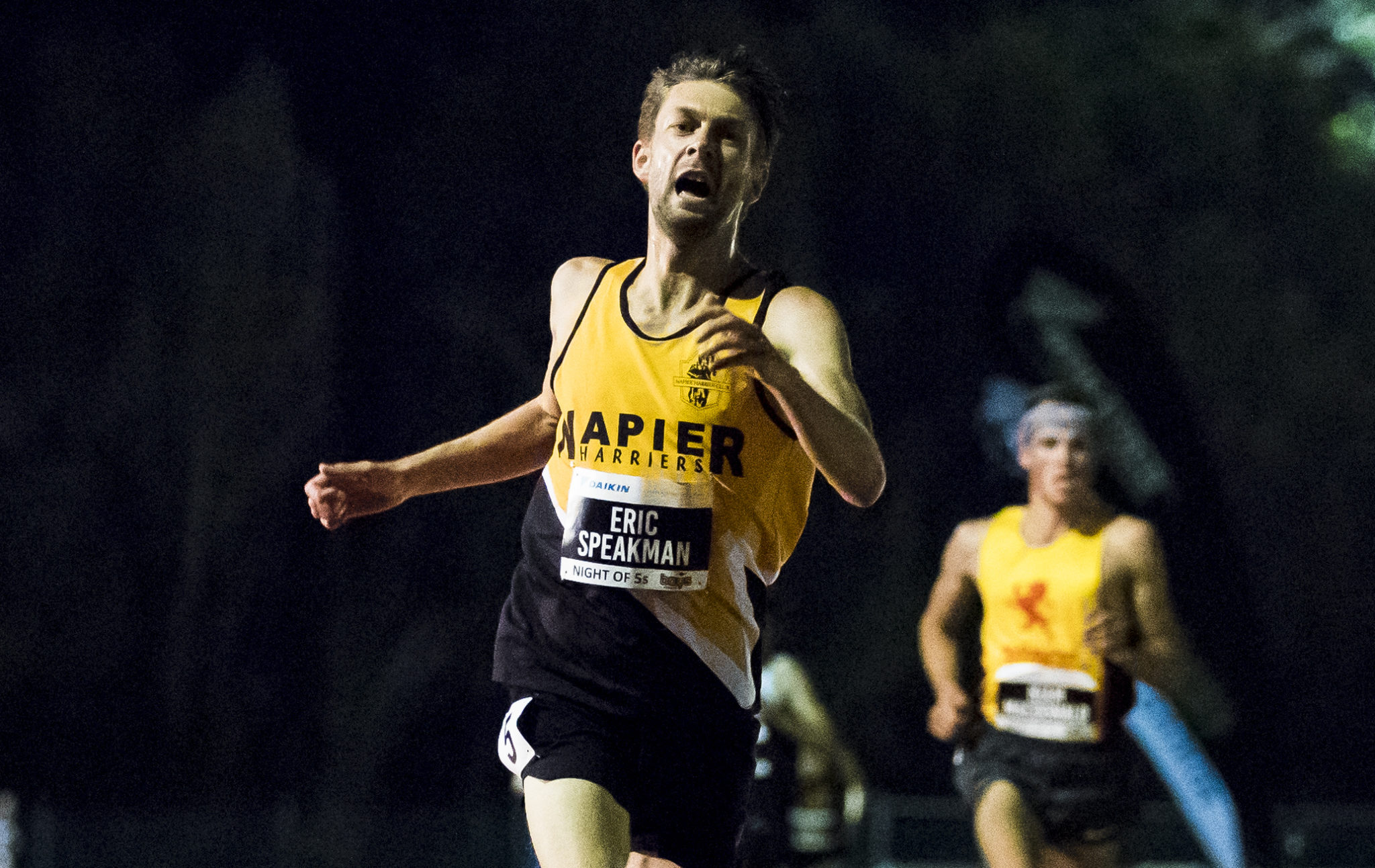News & Updates
Speakman storms back from injury in style

Eric Speakman comes home strong to win the 5000m at the recent Night of 5s in Auckland (Photo: Alisha Lovrich)
One of the most uplifting sights of the New Zealand domestic track and field season so far was the impressive breakthrough performance of Eric Speakman at the Night of 5s in Auckland last month.
There in a high-class men’s 5000m A race, Eric bounced back from several injury-plagued seasons to obliterate his previous best by more than 23 seconds – and clinch victory in a race record 13:31.84.
It has been some journey for the classy 30-year-old who, since winning the national 1500m title in 2017, has been ravaged by a succession of gut-wrenching injuries, which would have floored a less resilient athlete.
But never at any stage did Eric consider walking away from the sport he loves and his performance at AUT Millennium was rich reward for his patience and perseverance.
Raised in Napier, Eric made a huge breakthrough in 2016 under the guidance of Athletics NZ Distance Lead coach Steve Willis.
That year he set sizeable PB’s for 1500m (3:37.44) and 3000m (7.58.85) and also recorded a maiden sub-four-minute mile with a 3:57.30 performance at the Cooks Classic in Whanganui.
But, later that year, an Achilles problem hinted at the first injury issues which were to haunt him for much of the next three years.
The Achilles settled down sufficiently to allow him to triumph in the 1500m at the 2017 national championships in Hamilton but the issue worsened following a high-altitude training camp in Flagstaff, Arizona. Later that year, he flew out to Europe and took to the start line twice in Belgium but the pain, coupled with a lack of fitness, forced him to DNF on both occasions.
On his return home, he knew he faced little choice other than to undergo surgery.
“There was a whole cocktail of things wrong with the Achilles,” he explains.
“I had some Haglund’s bone growth shaved off, I also had a partial detachment of the Achilles and I had it re-braided and stitched up.”
Thankfully, the Achilles responded well to the surgery but the rehabilitation process was long and arduous. He did not re-start running until the winter of 2018 and in consultation with Steve, his long-time coach, he opted to target a new event for 2019.
“We had a discussion around qualifying, where I asked myself the question – is the goal to make the Olympic Games in the 1500m or is it to make the Olympic Games in whichever event I was capable of qualifying in?
“Sometimes we get hung up on the wrong event and pigeon-hole ourselves in a certain way. I’ve always known that if I’m in good aerobic shape, I can run a good 5000m which enables me to run better in the 1500m. I’d also previously run a sub-eight-minute 3000m, so we felt the steeplechase was an event worth exploring. I felt given my flat PB for the distance, and that if I became a reasonable hurdler, I could run around 8:30 – a mark close to qualifying for major events.”
He opened his 2019 with a modest 800m outing at the Potts Classic but disaster struck on his steeplechasing debut in Wellington in February of that year.
Misjudging the first water jump he cracked his heel on the edge of the water pit sustaining a calcaneus fracture which ruled him out for the remainder of the 2019 domestic track and field campaign.
After recovering from the injury, he was selected to compete at the 2019 Oceania Championships in Townsville in June and spent a period training and racing in the United States in preparation.
During his time Stateside, he won a low-key steeplechase in Hillsdale, Michigan in 9:08.24 but just days after this victory he started to feel foot pain, which was to be diagnosed as a stress fracture in the second metatarsal.
Once again, Eric was plunged into a period of rehabilitation before returning in good shape and running an ‘awesome leg’ (of 31:13 for the 10.163km distance) for Victoria University AC at the 2019 Road Relay Championships. However, just one week later, he suffered another major body blow as he was dealt the news he had suffered a third fracture for the year, this time on the left fibula.
For many athletes, another injury would have represented a moment of devastation and, although Eric was unquestionably very disappointed, he has always chosen to adopt a positive mindset.
“The Oceania’s would have been my first chance to run as a senior for New Zealand but I try not to get down in the dumps too much,” he says.
“Don’t get me wrong, I have my moments, but I’ve always had the view that when I have an injury, I just have to move forward.”
Eric also points to his excellent support network led by his family, coach Steve and Gary Henley-Smith, coach to New Zealand’s fastest man Eddie Osei-Nketia, whom he worked alongside at Wellington’s Scots College as a boarding master from 2017 to 2020.
“Gary was the person who probably most called me out if I woke up in a grump because I couldn’t run,” he says.
“He would say, ‘You’re still alive, you have lots of good things in your life going on’. He, along with my whole team, were great in that they all offered 100 per cent support. They all believe in me.”
Eric started to enjoy the green shoots of recovery in late 2019 as he spent a period training with two-time Olympic 1500m medallist Nick Willis in Flagstaff.
He also then managed to piece together a respectable 2020 domestic campaign, running a 1500m PB of 3:44.61 and winning 1500m bronze at the national championships in Christchurch.
However, with the Tokyo Olympics looming and Eric very much out of the picture in terms of qualification, the global pandemic served as a blessing in more ways than one for the Wellington-based athlete.
The Tokyo Games were rescheduled for the following year, allowing him an extra year to focus on his goal of Olympic qualification, and, living at Scots College during lockdown, he enjoyed an ideal training environment.
“It was a blessing to be locked down there because we had access to a gym and I had the school grounds to run in every day,” he says.
“I also had the opportunity to live with a coach (Gary Henley-Smith) who could check in on me every day. Steve obviously set the programme but I had a coach overseeing my progress. I enjoyed a good block of aerobic running but also worked on my top-end speed – I had a really good training stint.”
Following lockdown, Eric also tasted the benefit of two Athletics NZ endurance camps which brought together the cream of domestic talent.
The pandemic had forced many athletes onshore during the New Zealand winter – a period which typically would see many Kiwi athletes ensconced in the Northern Hemisphere.
The benefit of the vast majority of New Zealand’s finest endurance athletes being based domestically is that it has allowed for better quality racing while Athletics NZ has also organised endurance camps in Rotorua and Hawke’s Bay, which have played a vital role in Eric’s training progression.
“Covid brought everyone onshore which has really lifted the quality in New Zealand,” explains Eric, who recently moved to live in the Hutt Valley where he will soon take up a role at Hutt Valley High School as a commerce and social sciences teacher.
“You see it with the overseas training groups in that it helps enhance the overall level and reinvigorate everyone,” he adds.
Bar one small niggle, Eric has otherwise enjoyed an injury-free 2020 and a 10km road PB of 30:17 for second in Wellington in September, followed by a 31:39 clocking to claim bronze at the National Road Champs, hinted he was in good shape.
In Whanganui in early December, he ran a 2020 1500m best of 3:43.96 to place second behind Sam Tanner and, leading into the Night of 5s, he was confident of a quick time over the 12-and-a-half lap distance.
“I’d had a couple of good sessions in the lead up to the event and I targeted a PB,” he says.
In a lightning-fast race set up by pacemaker Sam Tanner, followed by pre-race favourite and national 5000m champion Hayden Wilde, Eric was part of a second group operating more than 50 metres back from Sam and Hayden for much of the race.
However, in the latter stages, Wilde started to slow and he was caught and passed on the penultimate lap by a lead group of four containing Eric. At the bell, any of the quartet could have claimed victory but it was the raw speed of the Napier Harrier which enabled him to accelerate clear of the opposition and produce one of the most satisfying results of his career.
“I was extremely pleased with the performance, it was the perfect race,” he recalls of the victory. “I can’t ask for much more than a 23-second PB, it sets my season up perfectly.”
Intending to next target the 3000m at the Potts Classic on his home track in Hastings later this month, followed by the mile at the Cooks Classic in Whanganui – where Eric will be looking to achieve his second career sub-four-minute mile – he is still very much open as to whether the 1500m or 5000m represents the best potential route to the Tokyo Games.
“Both are reasonably viable options,” he says.
“The domestic season is all about qualifying and picking up points and keeping an eye on what needs to be done to qualify.
“Due to my lack of racing, the tricky part means I need to score a lot of points in order to qualify. In the 1500m, I probably need five quality performances and, in the 5000m, I need three. Hopefully, with the Night of 5s already counting as one, the 5000m is a viable option too.”
Yet, whatever happens in a season of many possibilities for Eric, only one thing is certain – the steeplechase is definitely not a part of his future plans.
“That is completely off the table,” he admits.
“I really struggled to sequence the water jump. In fact, I don’t know whether I’ll ever go over a water jump again!”
Written by Steve Landells
